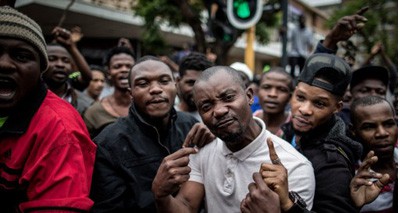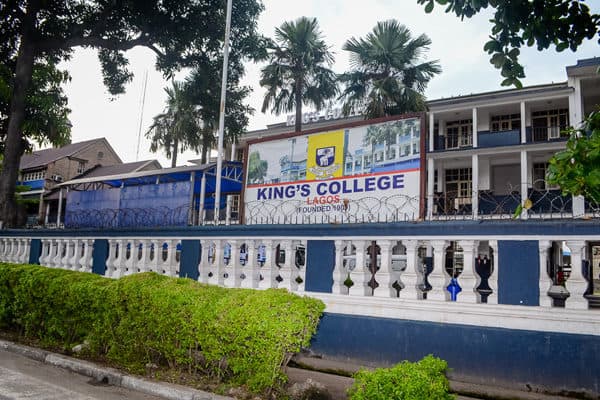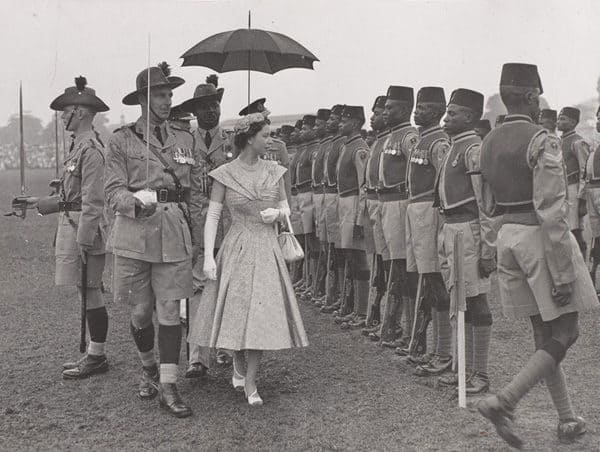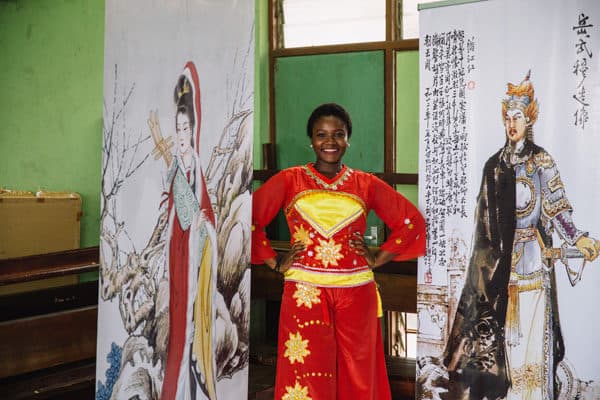A Nigerian’s View of Race
Okonkwo Akachukwu, American Renaissance, December 14, 2018

I am a Nigerian in his mid-thirties. Nigeria’s three most socio-politically dominant tribes are Hausa, Yoruba, and Igbo. Both my parents are Igbo — the tribe, I might add, with the reputation of being the brightest bulb in the Nigerian pack.
I was born and raised in Lagos and have lived and worked in several states in Nigeria. However, I left Lagos for the US when I was 16 years old and graduated from two American universities. Since then, I have returned to Nigeria for extended periods, but have spent more than one third of my life in North America.
We Nigerians have a very simple, no nonsense attitude towards race. In the words of one of my father’s friends, who is a master of concise maxims: “We know we are a useless race.”
It is worth keeping in mind, however, that such an admission is reserved almost exclusively for fellow Nigerians. I recall visiting my father at his house about three years ago. His eyes lit up as something on television jogged his memory. He pulled out his phone and played a short YouTube video for me of Rev. James Manning talking about the problems of black people. I distinctly recall how his wife sat beside me, occasionally clapping and nodding knowingly in silent agreement with virtually all of Rev. Manning’s points.
Among Nigerians, there is what is universally — yet seldom openly — referred to as the “Caucasian persuasion.” In a nutshell, every Nigerian supervisor or manager eventually comes to terms with the fact that, no matter how competent he may be, his Nigerian subordinates are simply far more likely to obey an Asian or a Caucasian.
One of my aunts who was born in Nigeria made her first million in the US. She started out as a cleaning lady earning minimum wage in downtown DC. Within 15 years of scrubbing her first toilet, she attended night classes, raised three daughters, acquired multiple properties in DC and Maryland, and ended up making more than a million dollars a year.
She decided to come back to Nigeria, and I can never forget her frustration at the behavior of the average Nigerian. She constantly described our people as listless, unmotivated, shifty, frustratingly slow-minded, incompetent, and “empty”. When I asked her to elaborate on what she meant by “empty,” her response was: “Oh, you know what I mean. Like there is nothing up there,” she said while lightly tapping her temple.
Colonization is supposed to have been a terrible thing for Africa, but I seriously doubt any Nigerian is glad that the British are gone.
My favorite uncle left Nigeria for the US about 30 years ago. At the time of his departure, the naira — Nigeria’s currency — was almost equal to Great Britain’s pound. To this day, he swears that our naira was readily accepted in Tesco, a British store. He said his ticket to Britain cost him no more than 2,000 naira. Today, that can hardly buy a decent meal in Lagos.
The paper version of our currency is no longer accepted outside our borders. I have naira banknotes gathering dust in my bookcase; I have never been able to get them converted in any country I have visited.
Almost every institution or legacy left behind by the British has either deteriorated past the point of utility and recognition or has simply ceased to exist.
For instance, King’s College London is, through today, a respected institution.
King’s College Lagos (the equivalent of a high school in America), established in 1909, is the school I attended. It is a disaster. I spent all six years in the packed, overcrowded hostels where we were on jovial terms with rats. It was not unusual to come back after classes only to find human excrement on the hostel floors because the shared toilets were too filthy even to pass by, much less use. It would have taken an intrepid plumber to brave the exotic mountains of filth merely to reach the toilets, much less repair them. The school soccer field become the unofficial toilet.

When a certain leader of a certain country refers to other countries, such as Nigeria, as s**tholes, that is not the least bit racist. It is, unfortunately, merely descriptive.
The fences at the school were routinely broken so that students could bring prostitutes onto the premises for a short session. It was not at all uncommon for a young student to be attending to the call of nature at night in the overgrown grass while another would be engaging a local woman only a few yards away.
Boarding students, particularly the more vulnerable junior students, often went without food or drinking water. These basic necessities should have been covered by our school fees but the funds were almost always misappropriated by school staff. Underfeeding was so widespread that my friends and I might go for two weeks without defecating. Drinking water was sometimes so scarce that we might padlock a pail of water in a locker, only to find the lock broken by morning.
Sexual molestation of the younger students was a matter of course. The only way to avoid that was to avoid sleeping in hostels. Some of my fondest childhood memories are of sleeping on the rooftops of classroom buildings to avoid predation, swatting at mosquitoes and watching the stars and discussing the nature of the universe with close friends. I was a natural storyteller, and my friends also enjoyed these evenings.
Electricity was a problem in the hostels, so it was impossible to read at night. I used to climb the fence — not to steal or to chase whores — but to find a functioning street light. I recall finishing Stephen King’s Shawshank Redemption under a street light very close to the huge glass building known as Church Gate.
King’s College is considered an elite institution in Nigeria.
If any major British government official were to ever ask me if my people are glad the British are gone, my response would be simple. “No, we are not. Come back. Please.” There is a kind of adulation of the British that is on display when a Nigerian goes to Britain for the first time — even if only for one week — and comes back with an affected British accent.

Queen Elizabeth II inspecting Nigerian troops in 1956.
On the other hand — and I freely acknowledge this is a stark contradiction — virtually all Nigerians and Africans believe that Africa’s poverty and instability are due to European exploitation. If it weren’t for ndi onyi o cha (Igbo for “those white skins”)! I have never understood this line of reasoning. If Africa was worth plundering, why are Africans unable to plunder Africa’s resources to build their own advanced civilizations?
This African tendency to blame others for our own shortcomings is a perfectly natural, if unhealthy, coping mechanism. One cannot live year in year out in squalor, social stagnation, and rampant crime and simply accept that this is perhaps the best level at which one’s people can operate. It is far easier and all too human to push the blame elsewhere.
Another purpose for the demonization of whites by Africans is to serve as a moral justification for plundering and exploiting whites. I need not outline the very many tactics of plunder. Green-card fraudulent marriages are a common example. For years, my own family has been struggling in vain to get me to “follow tradition” by marrying an akata (Igbo slang for African-Americans) in order to get “papers.” Of course, the anchor-baby phenomenon is exploitation, as is mass migration to Europe.
A few years ago, a Nigerian friend remarked that he had survived for years in the US by never paying for groceries. Whenever he was approached by a store attendant as he wheeled his cart towards the exit, he would simply yell aggressively in our native tongue, never once pausing for breath as he made for the exit.
White guilt makes white people easy to plunder. It is why white professors everywhere give black students preferential treatment that amounts to unjust discrimination against the rest of the class.
There is something unusual about the psychological makeup of white people. It can be metaphorically described as an inner compass. Due to that inner compass, white people need very little external force or punishment. They do not need much policing, so people can apply their potential to useful activities rather than wasting time donning a uniform and swinging a night-stick.
The absence of this inner compass is why, in Nigeria, no number of police officers can enforce traffic laws at an intersection. Indeed, most traffic enforcers and police officers routinely break the laws they are supposed to uphold (and still insist on taking a bribe at every random stop).
While this inner compass has tremendous advantages for white society, one disadvantage is that members of that inwardly guided culture are prone to tremendous torments of conscience that make them vulnerable to manipulation. There seems to be a miasma of guilt inherent to the very fabric of Western culture, a feeling of inadequacy for failing to measure up to one’s internal yardstick.
Although slavery was a universal phenomenon that preceded the US, no black, Arab or Asian man ever seems to experience racial guilt because of it.
I have no idea just how far down the rabbit hole of insanity this suicidal phenomenon of white guilt will go. One thing I do know is that most cultures, especially Eastern ones, suffer little to none of the white man’s inner conundrums and have zero patience for the social shakedowns and inefficiency of black culture.
The blunt truth is, as far as blacks are concerned, whites have become lambs, practically begging for slaughter in a world filled with lean wolves. We blacks have grown accustomed, even dependent, on the easy milk of guilty teats. What will happen to us when a less masochistic civilization replaces whites?
The future I see for Africa is as an economic outpost or colony of China. We Africans possess no human capital, in an age that requires the economic leveraging of human capital. The cars in our streets do not bear African names; they bear the names of Japanese, American, French, and Italian automotive innovators.

A local student wearing traditional Chinese clothes at the Confucius Institute of the University of Lagos in Nigeria. (Xinhua/Zhang Weiyi) (Credit Image: © Xinhua via ZUMA Wire)
We have no major industry other than the natural resources beneath our feet, and our elites squander the revenues on luxury items from other civilizations. We are converting our only assets into rapidly depreciating foreign trinkets and distractions.
In the natural course of things, Africa’s resources will, once again, be exploited by a civilization — in this case Chinese — that is economically and technologically superior to ours. In the next 40 years, China’s influence will be immense, and the Chinese are not sympathetic, as whites are, towards the antics of Black Lives Matter.
I doubt that the reality of our plight will ever be universally accepted by Africans. I don’t think the average Nigerian realizes just how serious the problem is. We know, deep in our hearts, that our country is not working, but what is the solution? There are only so many African migrants other countries can accept. Our problem thus becomes a world problem.















